Crickets have hit the high street - can they save the planet?
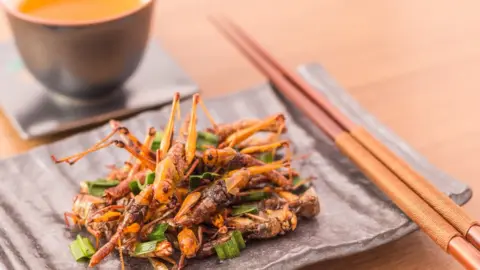 Getty Images
Getty ImagesNot that long ago, many of us would grimace at the idea of eating raw fish, crunching on kale or slurping on a chia smoothie.
Now thousands of us munch on California rolls doused in soy sauce during our lunch break without a second thought.
But what about adding some crispy crickets to your poke bowl?
This week Abokado, a sushi chain based in London, has done just that and says the crickets are "healthy" and "sustainable".
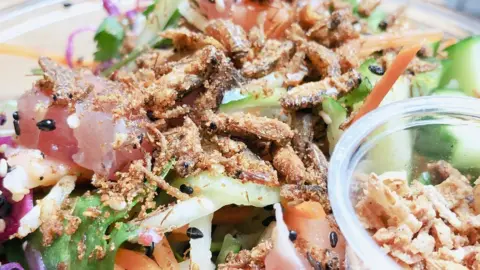 Eat Grub
Eat Grub"In a few years insects will be a normalised food in our everyday diet," Abokado's managing director Kara Alderin says.
Last year, Sainsbury's started selling grubs as snacks in 250 of its stores.
Packets of Eat Grub's smoky BBQ crunchy roasted crickets are also now sold in Ocado at £1.50 a packet.
They are marketed as a healthy, protein heavy, environmentally friendly alternative to traditional meat and fish options.
But eating insects is nothing new - in fact insects are eaten by around two billion people around the world.
It's known as "entomophagy".
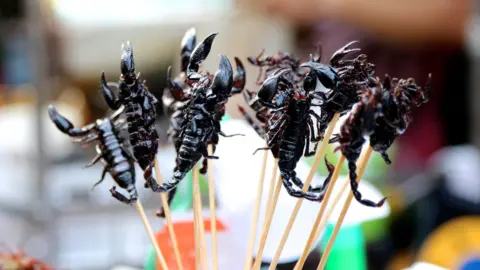 Getty Images
Getty Images'Enormous environmental benefits'
Many insects are eaten completely whole - wings and all - whereas we only consume around 40% of a cow.
A 2013 UN report suggested that eating insects could help boost nutrition and reduce pollution.
"I hope that eating insects will become more normalised because they have such enormous environmental benefits," Dr Tilly Collins from Imperial College London argues.
"In the Western world we have a sustainability crunch looming where we simply can't eat the amount of meat we do.
"In developing countries eating insects can be a really important source of nutrition where there's a real problem with food security."
Farming insects uses only a fraction of the land, water and feed required for traditional livestock - insects are also estimated to release 80% less methane than cows.
"We can grow insects on food waste so we convert something that is essentially a waste product into a protein," Dr Collins says.
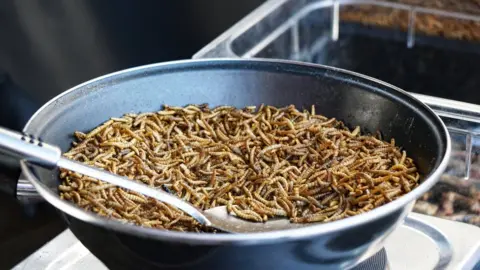 Getty Images
Getty ImagesCompared to pigs, mealworms produce between 1% and 10% of the greenhouse gas per kilogram.
But not all insects are more sustainable than traditional meats.
"Some low-footprint locally sourced meats will likely be more sustainable than some resource-intensive imported insects", says, Charlotte Payne, a zoologist at the University of Cambridge.
"There is certainly a huge difference in environmental impact between some insect products on the market in the UK today.
"Certification could be a really good way of ensuring that the whole insect food movement doesn't succumb to threats to environmental sustainability that have emerged with other types of commercial agriculture in the past few decades."
'Mass producing insects isn't the answer'
Joshua Evans, who co-wrote On Eating Insects, argues that insects may not be the environmentally-friendly alternative many are hoping for.
"If we think insects will suddenly change the catastrophic effects of monoculture and mass production, we will be sorely disappointed," he argues.
 Getty Images
Getty ImagesSpeaking to the Globe and Mail, he says the same expectations were placed on soy in the mid-20th Century.
He says soy was turned into a patentable product, "causing massive deforestation of the Amazon to plant vast monocultures whose yield is then shipped elsewhere so that we can continue to produce very cheap beef".
Mr Evans added: "Swap out soy for insects, and you have a version of the story that currently unfolds."
But if we're really serious about saving the planet through our eating habits, a plant-based diet is the only answer to help reduce emissions, according to the Vegan Society.
"It is widely recognised that eating animal products has a huge environmental impact, yet this is not at all incorporated into policy", the society's chief executive George Gill says.
"Animal agriculture has not taken its share of emissions and it's becoming increasingly clear that we will not be able to meet the Paris Agreement unless we make a national shift towards plant-based diets."
'Caramelised mealworms are delicious'
Picking up a winged creature or crunching on a crispy worm still fills many with horror.
When it comes to trying them, children are much more enthusiastic compared to their parents, according to new research by Imperial College London.
"There's an open age when people are young that they're very receptive to changes in diet," Dr Collins says.
"Some insects are utterly delicious - on the whole they are a range of flavours and nutritional profiles that are really complimentary to a plant-based diet."
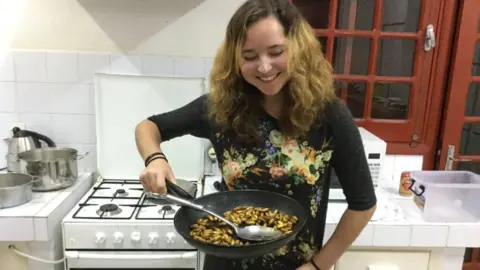 Charlotte Payne
Charlotte Payne"People are scared to try something unfamiliar - and most people don't automatically link insects with deliciousness," Charlotte Payne adds.
"But fortunately there are now more people talking about insect foods, and in the last eight years of working in this field of research I've definitely noticed a shift in the attitudes of the UK public towards edible insects."
In January, Radio 1 DJ Adele Roberts ate insects for a week as part of a documentary Grub's Up: Eating Insects for a week.
"It's changed my view on edible insects, and I'd definitely consider eating them if they were on the menu at a restaurant or if they came with a dish.
"They're very tasty if you know how to cook them properly," Adele says.
Allow Instagram content?
Since then, Adele says she's not eaten them regularly - but that's partly down to there not being much choice on the high street.
"Finding where to buy the edible insects is still a problem.
"There are products starting to appear on the high street and online but the range is still relatively small compared with other protein sources.
"You need to know where to buy the products from, and a lot of the ones that are available are processed - so not something I'd really choose anyway," she says.
